Common Misconceptions About Night Baths
According to specialist 2 Truong Thien Niem, Head of the Examination Department, Gia An 115 Hospital (HCMC), one of the most common misconceptions is that "just taking a warm bath at night will not cause harm". In fact, even if using warm water, sudden changes in temperature when the body is tired, hungry or after strenuous exercise can cause peripheral vasodilation, easily leading to hypotension, arrhythmia or stroke in people with underlying diseases.
Many people believe that bathing at night helps them sleep better, but this is only true if they take a warm bath about 1 to 2 hours before bed and dry and keep their body warm. On the contrary, bathing close to bedtime (especially cold baths) can cause sleep disorders due to a sudden drop in body temperature, disrupting autonomic nervous system regulation, leading to insomnia, headaches or colds.
“Another misconception is that a quick shower is fine. In fact, even a short shower can cause a sudden change in body temperature, which can have a strong impact on the cardiovascular and respiratory systems, especially if the hair or body is not dried before going to bed, increasing the risk of colds, pneumonia, or strokes at night,” said Dr. Thien Niem.
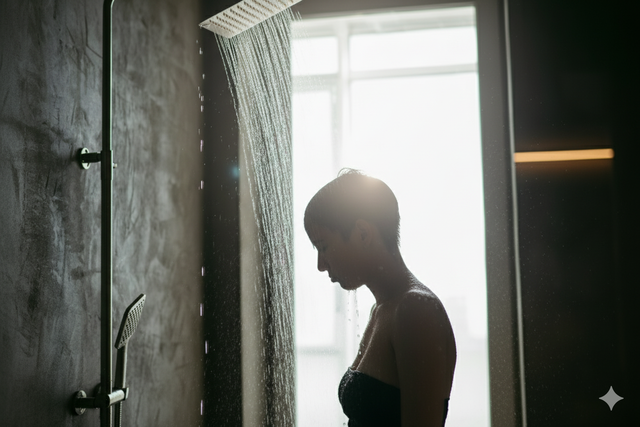
If you have to bathe at night, you should bathe with warm water, about 37-40 degrees Celsius, in a wind-proof room.
Photo: AI
What risks can bathing at night cause?
Bathing at night, especially after 10pm, can cause many negative effects on the cardiovascular and nervous systems, due to sudden changes in body temperature.
Doctor Thien Niem explained: “When bathing in cold water, the temperature lower than body temperature will cause peripheral blood vessels to constrict, causing a sudden increase in blood pressure and a rapid heart rate, which can cause a stroke (cerebral hemorrhage). When bathing in warm water, the temperature higher than body temperature will cause peripheral blood vessels to dilate, causing a sudden decrease in blood pressure and a rapid heart rate, which can cause a stroke (cerebral infarction)”. Especially, in groups of people with a history of cardiovascular disease such as high blood pressure, carotid atherosclerosis, coronary artery disease, overweight..., the risk of stroke is higher.
In addition, the difference in body temperature and bath water can also stimulate the sympathetic nervous system, causing the body to "startle" in reaction, with symptoms such as dizziness, lightheadedness, lightheadedness or trembling; if you bathe when you are tired, hungry or have just drunk alcohol, the risk of stroke is higher. Not only that, bathing at night also affects sleep, the respiratory system and scalp diseases.
Doctor Thien Niem warns: “After bathing at night, if the body shows signs such as headache, dizziness, vertigo, trembling hands and feet, rapid heartbeat or anxiety, special attention should be paid because this could be a vasoconstriction reaction and temporary circulatory disorder”. If this condition persists or is accompanied by difficulty breathing, chest pain, nausea, slurred speech, hemiplegia or fainting, it is a serious warning sign, possibly related to transient cerebral ischemia, arrhythmia or stroke, and you need to go to the hospital for immediate examination.
In addition, a feeling of prolonged chills, dull headache, cough or runny nose after bathing at night also indicates a risk of pneumonia, sinusitis, cold or recurrence of chronic cardiovascular or respiratory diseases.
How to take a safe bath at night
Not everyone can arrange an early shower time, especially those who work night shifts, athletes or people with late living habits. However, showering at night has many potential risks, especially for people with cardiovascular disease, blood pressure, diabetes or the elderly.
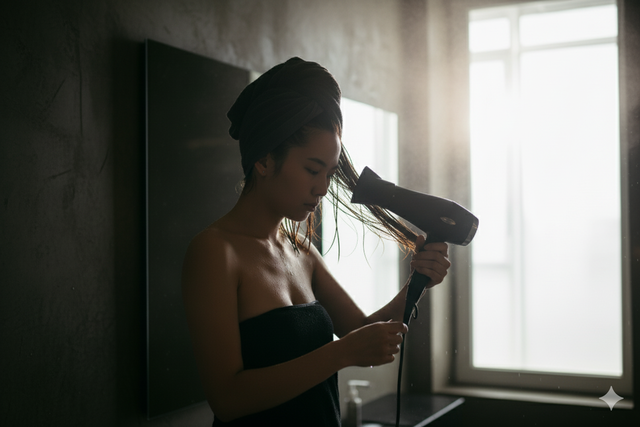
After bathing, dry your body and hair before lying down to rest.
Photo: AI
If you must bathe at night, Dr. Thien Niem notes the following to ensure health safety:
- Do not bathe immediately after heavy work, exercise or drinking alcohol.
- You should bathe in warm water, about 37-40 degrees Celsius, in a draft-free room.
- Don't wash your hair too late or go to bed with wet hair.
- Bath time should be short, about 5-10 minutes. After bathing, dry your body and hair before lying down to rest.
- If you often have to take a late-night bath, you should proactively create a habit of doing a light warm-up before entering the bathroom, and pay attention to regular health monitoring if you have an underlying disease.
Besides, according to Dr. Thien Niem, after bathing at night, the most important thing is to keep the body warm properly to avoid catching a cold and avoid negative effects on the cardiovascular and respiratory systems. Some ways to keep the body warm recommended by doctors are as follows:
- Dry your body and hair immediately after bathing, especially your head, neck, nape, and soles of your feet. These are the areas most susceptible to cold.
- Wear comfortable, absorbent, warm clothing. Avoid lying directly under an air conditioner or fan.
- Drinking a glass of warm water or ginger tea or chamomile tea before bed will help your body relax, improve blood circulation and keep you warm inside.
“People who regularly have to bathe at night should maintain a reasonable diet and lifestyle, supplement adequate nutrition and exercise gently to increase resistance, helping the body adapt better to temperature changes,” said Dr. Thien Niem.
Source: https://thanhnien.vn/bac-si-luu-y-cach-tam-dem-an-toan-185251115231823328.htm


![[Photo] Prime Minister Pham Minh Chinh meets with representatives of outstanding teachers](https://vphoto.vietnam.vn/thumb/1200x675/vietnam/resource/IMAGE/2025/11/15/1763215934276_dsc-0578-jpg.webp)
![[Photo] Panorama of the 2025 Community Action Awards Final Round](https://vphoto.vietnam.vn/thumb/1200x675/vietnam/resource/IMAGE/2025/11/15/1763206932975_chi-7868-jpg.webp)



![[Photo] General Secretary To Lam receives Vice President of Luxshare-ICT Group (China)](https://vphoto.vietnam.vn/thumb/1200x675/vietnam/resource/IMAGE/2025/11/15/1763211137119_a1-bnd-7809-8939-jpg.webp)








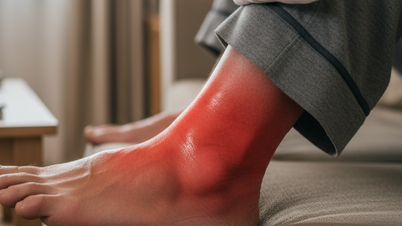



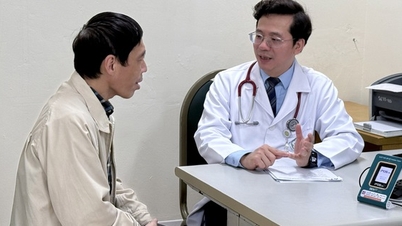





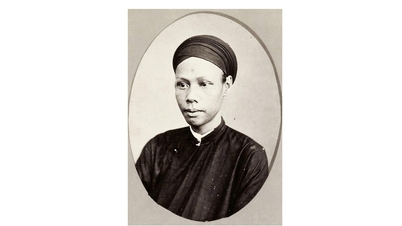















































































Comment (0)